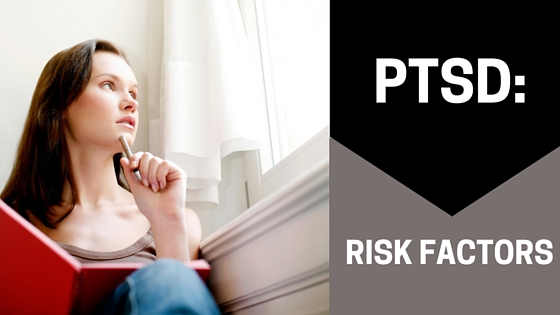Last week, we introduced a series on Posttraumatic stress disorder (PTSD), in honor of PTSD Month. Today, we’ll look closely at potential risk factors for developing PTSD.
Remember, PTSD develops in response to a traumatic or life threatening event that is outside the normal range of daily life stress. It can arise due to trauma, and symptoms last longer than a few months, are very upsetting, and disrupt daily life.
WHY DO SOME PEOPLE GET PTSD WHILE OTHERS DON’T?
Traumatic events are the main risk factor for PTSD, but trauma does not always result in PTSD. Studies estimate that between 6% to 30% or more of trauma survivors develop PTSD, with children and young people amongst those at the high end of the range. Women have about twice the risk of PTSD as men.
Researchers are trying to determine factors that might increase vulnerability to catastrophic events and put people at risk for develop PTSD. Some studies report the following may be risk factors:
Nature and extent of trauma. Often, the more traumatic the experience, the greater the impact it will have on one that experiences it.
Coping skills. People with a better ability to cope with stress may have fewer and milder symptoms.
Previous experiences. People who have experienced traumatic events in the past may be at greater risk of developing PTSD.
Current stress level. One’s greater life context as it relates to stress is likely to affect one’s vulnerability to trauma.
Support systems. Those lacking support systems, including family and friends, are likely to have a much more difficult time recovering from a traumatic experience. For example, there are fewer opportunities to talk about traumatic experiences with others.
Shame. If victims feel ashamed or guilty, given traumatic experiences or symptoms related to those experiences, it’s more likely that PTSD can develop. Those victims that are treated with empathy and understanding have a better chance of healing.
Pre-existing emotional disorder. People are at higher risk for PTSD if they have a history of an emotional disorder, particularly depression, before a traumatic event.
A family history of anxiety and sleep disorders, especially sleep apnea.
Childhood separation from a caregiver or parent.
As a reminder, everybody responds to trauma differently, despite the possible risk factors listed above, so it’s always best to seek help from a mental health professional, such as a therapist or a counselor, if you have any questions or concerns. Next week, we’ll provide you with a questionnaire that may help in the screening process for PTSD.
In the meantime, if you or a loved one are struggling with thoughts or feelings, treatment can help — whether or not you have PTSD. Therapy services can be helpful as you begin to take small steps in your life towards meaningful healing. At TherapyWorks, our experienced therapists can help you implement relevant and effective solutions that you’re looking for.
And because convenience is important, our professional and responsive support team offers convenient scheduling options, evening and weekend appointments, and contemporary privacy practices.
We encourage you to take advantage of a free consultation in our Los Gatos or Santa Cruz locations . Contact us today and we’ll help you.
